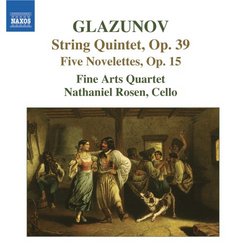Some Glazunov Juvenilia and a Masterful String Quintet
J Scott Morrison | Middlebury VT, USA | 04/14/2007
(4 out of 5 stars)
"I put this CD in the player without reading the booklet and without noting the order of the works on the disc. The first several cuts were charming but negligible pièces characteristiques that were like cotton candy, sweet enough but not nourishing. I found myself thinking that a common impression of Glazunov's music -- that it is pleasant enough but not very substantial -- was being substantiated. Then I read the notes and discovered that the music I was hearing was the 'Five Novelettes' and that they had been written when Glazunov was sixteen! That mitigated my initial impression because for all their empty calories they are cleverly and skillfully written. For instance the second movement, called 'Orientale', makes artful use of musette-like drones that support, alas, a banal hootchy-kootch tune. It's the construction that impresses, not the musical materials. And the fourth movement, Valse, is really rather nice, with a melody that sticks in the mind.
But when we come to the String Quintet in A major, Op. 39, written when Glazunov was ten years older in 1891, we are in the presence of a masterly work for string quartet plus second cello. The opening Allegro is a classic sonata-allegro form with impressive handling of the tuneful first and second themes; there are some notable moments for all five instruments and after an impressive development a fine recapitulation with a Brahmsian coda. The Scherzo starts with a sustained viola note against pizzicato fripperies by the violins which then state and develop the main theme. A lyrical minor-key trio follows before a return to the A section and a final coda. The Andante opens with an arching melody played by the second cello. Lyrical in the extreme, this movement sounds the most Russian of the four, reminding one at times of Tchaikovsky's string sextet 'Souvenir of Florence' with its extra emphasis on the outpourings of the lower strings. The finale, marked Allegro moderato - Allegro vivo, begins with an irregularly-accented minor-key theme that also sounds Russian (not necessarily a common occurrence in Glazunov's music) which is then developed fugally. This is followed by a tranquil middle section and then return of the earlier music, this time with lightening major key interjections. All this leads to a final section marked Presto which ends breathlessly and triumphantly. This work, which I'd never heard before, leads me to think maybe I ought to explore more of Glazunov's chamber music.
The members of Fine Arts Quartet, one of America's finest and long resident at the University of Wisconsin - Milwaukee, are joined by Tchaikovsky Competition cello gold medalist Nathaniel Rosen for this fine disc. I have given the CD four stars rather than five largely because I doubt I'll be returning often to the 31-minute 'Five Novelettes'. But I'll definitely return to the Quintet.
Scott Morrison"

